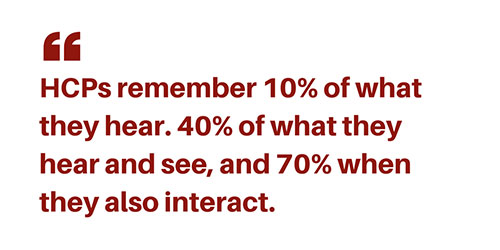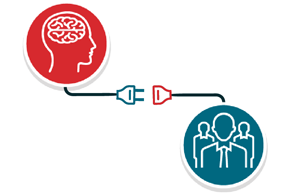Last week, I was at a speaker program. There were some slides, mostly blue, with quite a bit of data accompanying the speaker talk. There were a lot of good epidemiological data about how the disease has become an epidemic and that the product treated the drug marginally well, with almost no side effects, but I really don’t remember much more of what was said. Why can’t I remember the 50 minutes of data that were presented just a week ago? Am I losing my memory? The reality is that there’s nothing really wrong with me. I’m pretty normal—and if I can’t remember a week later, I’m sure others are struggling to remember.
Adult learning principles weren’t used in this presentation and there doesn’t seem to be much regard as to how adults learn in HCP education. In this article, I want to explain why improving speaker programs matter and how incorporating interactive smartphone technology can aid in HCP recall during a program.
With significant speaker programs in the pharmaceutical and medical device industries showing a negative return on investment (ROI), it’s time to ask ourselves: do we really care about ROI and if so, what can we control? In other words, most programs don’t return the money that they cost to conduct the program, yet if we don’t look for improvement, then we’ll continue to get the same results.
Overall, speaker programs do have positive impact, but ROI isn’t where the impact is best seen. Many companies choose not to look at ROI because—with speaker honoraria added to program costs—it becomes a losing battle unless attendance and impact are higher than average. In fact, companies often choose to look at changes in brand awareness, market share growth, and changes in brand attitude instead of ROI. Those are easier to achieve—and make more sense when it comes to justifying the cost.
So, is there a way to improve ROI for speaker programs or virtual speaker programs? When we look at the variable components that make up a speaker program, we ask ourselves which of the following can we really influence?
- The Recruitment
- The Venue
- The Speaker
- The Content
- The Program Execution
In reality, we know that Sales Representatives are going to drive attendance to the best of their ability, but sometimes that’s very poor. We know that sales representatives generally have strong opinions on venues—and they usually score an A. Speaker effectiveness can be managed within speaker training programs, but the long-term impact of adult training of physicians is low. The content is a function of internal struggles with marketing, legal, medical, and regulatory and by the time this recipe is baked, it’s usually dry and hard. Marketers give up as they do their best with what little levers they have to pull.

While this may sound bleak, there is one change you can make that will improve the attendees’ engagement, the program execution, which impacts understanding of the content. Remember that healthcare professionals (HCPs) learn by doing. They remember 10% of what they hear, 40% of what they hear and see, and 70% when they also interact. Yet interactive technologies haven’t been used much for speaker programs.
Adding interactive smartphone technology to your speaker programs will only enhance their overall experience—and in so doing—will improve their recall, and assuming your product adds value, they’ll use it when appropriate.
There are many inspiring technologies you can add to your live speaker programs and this is what’s missing today. Technologies can improve learning by encouraging the audience to get more involved. They can reinforce learning by allowing attendees to capture the slides, keep the audience chair-forward by incorporating polling throughout the program and allow for attendees to ask questions along the way so they don’t forget to ask them later in the program during a more formal question and answer session.
Shing, Wong, Founder of Ampslide said, “With data-rich, technical presentations, speakers may present at speeds that are not easy for attendees to grasp the full value of the content being presented. Attendees can miss numbers and facts that are important to them. By utilizing interactive software on smartphones, attendees can review content in real-time in the palm of their hands and even take notes, improving learning and understanding. In a survey conducted with conference attendees using Ampslide’s interactive presentation and engagement software, attendees found the ability to instantly go back to review a speaker’s slides during a presentation to have overwhelmingly improved their experience.”
Adult learning principles apply to most adults, but in my experience, more so with Healthcare Professionals (HCPs). HCPs learn by doing. Doing leads to greater memory recall and ultimately help you achieve your goal of improving the way HCPs treat their patients. Now is the right time to incorporate interactive technologies into your programs.





